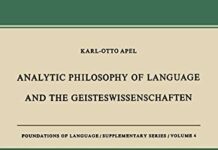
Ebook Info
- Published: 1995
- Number of pages: 291 pages
- Format: PDF
- File Size: 12.71 MB
- Authors: Karl-Otto Apel
Description
Charles Sanders Peirce is widely recognized as the founder of American pragmatism. Apel’s systematic, sweeping, and innovative study quickly turned into a classic of Peirce scholarship when first published and became a major factor during the late sixties and early seventies in the discovery of pragmatism by Continental philosophy. The work discusses the historical importance of pragmatism as one of the major modern responses to the “disintegration of the Hegelian synthesis.”As a mediation between theory and praxis, Apel presents pragmatism as the major rival to both existentialism and Marxism, the two other responses to the Hegelian aftermath. In the same context, Apel demonstrates the importance of Peirce’s conceptual breakthroughs, in the theory of signs (semiotics) and the theory of rationality, for the challenges and possibilities of a critical theory of society.The contemporary developments of the Frankfurt School, in its third generation now, cannot be understood without Apel’s appropriations of Peirce for a grounding of a critical theory of society as formulated in this systematic reconstruction of modern philosophy. This work is also crucial for an understanding of Apel’s own philosophical project of a transcendental pragmatics, or semiotics.With the revival of Peirce studies, and the rediscovery of the pragmatist tradition in American philosophical thinking, this study articulates a very contemporary and relevant interpretation that may challenge and even go against the grain of many so-called Neopragmatists. This book will also be of interest to those scholars interested in the development of post-World War II German thought, and the influence of North American thinking on European thought in general.
User’s Reviews
Editorial Reviews: Review “Apel’s book is the most important one that has been published in this field after the war. Apel carefully discusses the different stages of the development of Peirce’s work.” About the Author Karl-Otto Apel is professor emeritus at the Goethe University in Frankfurt, Germany. He is the author of numerous books, including Transformation of Philosophy, and the two-volume publication of Karl-Otto Apel, Selected Essays: Towards a Transcendental Semiotics, edited by Eduardo Mendieta (also published by Humanity Books).
Reviews from Amazon users which were colected at the time this book was published on the website:
⭐A good indicator of the depth and fecundity of Peirce’s philosophy is the many excellent books written about it, together with the great variance in their interpretations. From Pragmatism to Pragmaticism has one of the broadest presentations of Peirce’s views. It is one of the more difficult books I’ve read on Peirce, but it’s also proven very useful.Apel utilizes the three fundamental categories to unify and explain Peirce’s concepts, and that improves its coherence, which sometimes seems to push the boundary. He develops notions such as `meaning-critical realism’ and `regulative principles’ as key explanatory tools. Ultimately, Apel gives priority to presenting a `social pragmatical’ view of Peirce, as opposed to a metaphysical interpretation. This emphasis is not congenial to my taste, but is nonetheless fruitful and interesting.Apel reveals internal tensions within Peirce’s system, as he vacillated on some critical issues. Some authors minimize it, but (like T.L. Short) not Apel. That increases the difficulty level of the book, as the various dynamical positions are not as well organized as they could be. The book is written in a discursive, hermeneutic style, and not as a carefully constructed thesis. It feels like Apel has several agendas, and it isn’t always clear which one is operative at any moment.The book is a difficult slog in places, as it juggles Peircean topics like pragmatism, semiotics, synechism, tychism and agapism, with their connections to other philosophers (Kant, Hegel, Nietzsche, James, Royce, phenomenology, et. al.), and Peirce’s developmental stages. In different stages, the discussion ranges from metaphysics, to logic, to human praxis (and more). Considering all this complexity, and despite the typical clarity of Apel’s writing, it would be a small wonder if one didn’t sometimes feel confused and overwhelmed. But the benefit to the reader is the context you gain. This is unmatched in any other Peirce book I’m aware of. From Pragmatism to Pragmaticism is a book you’ll want to “live in” for several weeks.
⭐If you still believe that the enlightenment is more convincing than unquestioned ignorance (or what amounts to the same thing–a philosophical return to fundamentalist authoritarinism hidden within a philosophy of what is thought to be radically ‘other’) this book is a great book to have. Or if you are convinced by the arguments of Habermas but wish that he would stop apologising and parsing words with himself, then this brilliant and above all clear book by Karl-otto Apel is for you. Apel is one of the last philosophers left who can make a strong argument in favour of reason. He is the last great scientific and rational humanist left in an intellectual landscape which is more and more looking like an ode to the ultimate demise of reason and sanity.
Keywords
Free Download Charles Peirce : From Pragmatism to Pragmaticism in PDF format
Charles Peirce : From Pragmatism to Pragmaticism PDF Free Download
Download Charles Peirce : From Pragmatism to Pragmaticism 1995 PDF Free
Charles Peirce : From Pragmatism to Pragmaticism 1995 PDF Free Download
Download Charles Peirce : From Pragmatism to Pragmaticism PDF
Free Download Ebook Charles Peirce : From Pragmatism to Pragmaticism

